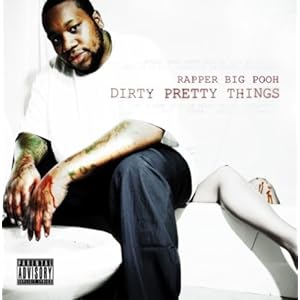 When two-thirds of Little Brother dropped solo projects back in September – frontman Phonte’s Charity Starts at Home and producer 9th Wonder’s The Wonder Years hit stores on the same day – we got the sense that Rapper Big Pooh, widely considered the Andrew Ridgeley of LB, was simply left in the dust, dwarfed by the distinct personalities and creative flair deployed by his contemporaries. Phonte had simply solidified his legacy, proving that the combination of Tay’s artistic voice and his judicious choices in musical collaborators yields terrific returns, and 9th’s record found dozens of hip-hop and r&b luminaries lined up five deep to collaborate with one of the most soulful beatmakers in the game.
When two-thirds of Little Brother dropped solo projects back in September – frontman Phonte’s Charity Starts at Home and producer 9th Wonder’s The Wonder Years hit stores on the same day – we got the sense that Rapper Big Pooh, widely considered the Andrew Ridgeley of LB, was simply left in the dust, dwarfed by the distinct personalities and creative flair deployed by his contemporaries. Phonte had simply solidified his legacy, proving that the combination of Tay’s artistic voice and his judicious choices in musical collaborators yields terrific returns, and 9th’s record found dozens of hip-hop and r&b luminaries lined up five deep to collaborate with one of the most soulful beatmakers in the game.
And, with all that in mind, it’s painfully easy to underrate Pooh. His verses were far from unwelcome on LB records – far from it, they often provided compelling counterpoint to valedictorian emcee Phonte – but they often seemed overshadowed. Phonte’s word-dense, heavily conceptual flow remains one of hip-hop’s secret weapons, but divorced from the spotlight-stealing Tay and 9th, Big Pooh has forged his own shine, and his workmanlike, uncomplicated, and agreeably honest brand of hip-hop yields dividends of its own. Perhaps that’s because he’s been working solo for longer – Pooh’s first record, the pretty-good Sleepers, arrived way back in 2005, even before LB’s second record hit stores – but whatever the case, Pooh largely sounds terrific on his latest, Dirty Pretty Things, and his own take on Little Brother’s mythology is completely beguiling.
On first listen, Dirty Pretty Things sounds intimately familiar – whatever the reason, every member of LB seems to skew soulful when they’re on the solo tip, and Pooh is no different: he’s less interested with launching into space than he is with spewing passionate street-corner poetry, and the crisp drums and smooth bass that pin down his record are slathered with generous helpings of piano and horns, the album quickly establishing a flow as effortless and silky as Pooh’s own. Lyrically, Pooh is less concerned with his own prowess – it’s one attribute that distinguishes him from Phonte, an emcee often wildly amused by his own witticisms – and more interested in exploring personal relationships and the futility of criminal life. He’s honest, direct and reflective on Dirty Pretty Things, and never less than compelling – as he ages, he both seeks and dispenses, since, as he raps on “End of the Empire”, “I don’t wanna be rappin’ when I’m old and grey.”
That’s not to say all is sage advice and Common-esque optimism in Big Pooh’s world. Of all the tracks on Dirty Pretty Things, “Money Getter” sounds the most out of place; even with a funny T-Pain reference and spiralling, wide-screen strings, Pooh classifies himself as an “independent nigga makin’ money with the majors” before reducing himself to a “money getter”. It sounds in its best moments like a victory lap from an artist who’s found success on his own terms, and in its worst uncharacteristically materialistic, particularly for an emcee with such a deep soul. Pooh finds chemistry trading braggy verses with Torae on “Are You Ready”, which rides a vocal sample that bears a striking resemblance to the opening “la, la, la la” from Kanye’s “Can’t Tell Me Nothin'”, and creates “Around the World” according to the well-worn “Area Codes”/”Girls, Girls, Girls” template, but focuses it on his own personal search for a mate, instead of using the track as a venue in which to tout his sexual prowess. More interesting than any of these is “5.13.11”, which seems to fall in line with the slow-jam-heavy back half of Dirty Pretty Things, opening as it does with a smooth, shimmering backing track and a Pooh verse ostensibly about romantic devotion and imminent domestication. But, fascinatingly enough, Pooh takes a turn for the unhinged halfway through, spinning the first-person narrative into a shocking portrait of obsession and paranoia; it’s all quite audacious and as abruptly dark and violent as a vintage Slim Shady murder ballad, and it becomes immediately apparent where the seemingly random murder scene depicted on the cover comes from.
But that’s Dirty Pretty Things; Pooh’s vision makes room for wisdom and social relevance even as it occasionally swoops into darker territory. Rapper Big Pooh remains an engaging host all the way through – really, it’s remarkable how plain-spoken and direct the man sounds, given his pitch-perfect flow and dexterous rhyme schemes – and his latest record sidles up comfortably next to those released by his former bandmates this year. Nobody on this earth would turn down a Little Brother comeback record, it’s true; but as long as the individual members are making good music, the boys are filling up their between-album years nicely.
Grade: B+

